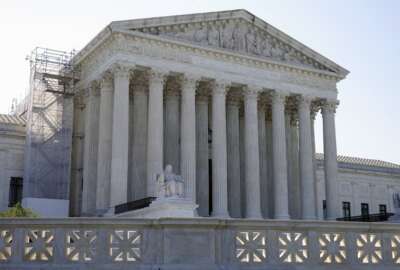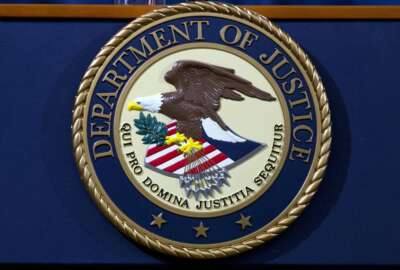Justice Department false-claims cases continue at a brisk pace
The government's pursuit of false-claims cases never takes a break. So far this year, recoveries have totaled just under $500 million and they appear to be on pace...
The government’s pursuit of false-claims cases never takes a break. So far this year, recoveries have totaled just under $500 million and they appear to be on pace for a full-year-yield of around $2 billion. For more on the trends, and some of the more remarkable settlements, Federal Drive with Tom Temin spoke to attorney Jonathan Phillips, a Partner at Gibson, Dunn and Crutcher.
Interview Transcript:
Tom Temin And you have done a pretty comprehensive tracking of everything going on in, I should say, not just whistleblower cases, but all false claims acts this year. Review what you’ve seen so far in terms of the pace of settlements, and it sounds like a lot more comes in the second half of the year than the first.
Jonathan Phillips I think that’s right. So far in 2023, it’s tracking. Certainly what we saw in 2022 and over the last 10 to 12 years in false claims act recoveries. I think you’re right. The latter half of the year tends to have more announced settlements, I think partly because of the close of the federal fiscal year in the fall. And so a lot of settlements often are announced around that time. So while there’s around 500 million that have been announced in FCA recoveries to date this year, that tracks with last year when the total for the year, as you mentioned, was around 2 billion.
Tom Temin And how much of this total settlement comes as a result of the government initiating action and how much of it proportionately is caused by people on behalf of the government? Relator’s under qui tam cases.
Jonathan Phillips Pretty consistently, with one exception last year. Pretty consistently roughly 90% of monetary recoveries and False Claims Act actions come from cases in which either the government brought it itself or intervened in allegations by a qui tam relator. Last year was bit of an outlier, because there was one particularly large settlement in a case brought by a relator that resulted in last year the number being over 50%. But if you look back over 10 to 12 years, on average, the government’s bringing in 90% of the recoveries in cases it pursues.
Tom Temin And is the government getting better at this? Because like in the health care repayment area, Medicare Medicaid services, they have really initiated much better tools for detecting fraud. In recent years, artificial intelligence and all of these kind of trends analysis across big data that they can zero in on some of these doctor rings that rig up claims in this kind of thing. So the government’s getting better at it. Fair to say?
Jonathan Phillips I think it’s certainly fair to say. And the government has made no secret about it, that they are using data analytics to identify outliers in the available billing and reimbursement data across different industries. And I think there are simply more qui tams. We’ve had a record number of qui tams filed every year for the last six or seven years. It just goes up and up and up. And I think not only is the government becoming better resourced in investigating and pursuing the cases, but the relator’s bar, the attorneys representing relators, investigating cases to find cases to bring are being better resourced and sophisticated as well.
Tom Temin And do we have any record or any statistic on the number of qui tam relator cases brought? What proportion of them are settled in favor of the relator? Because it is no small matter to bring a qui tam case, especially if you have to hire a lawyer, you may have to lay out a lot of money. And sometimes these things can take a decade before you actually get paid if you win.
Jonathan Phillips So the statistic announced by the government is they declined to intervene in approximately 80% of qui tam cases. Now, after that, it becomes a little bit fuzzy because the announced statistics kind of end there, and because Relator’s have the option to dismiss the case after the government declines it’s very often the case where a relator thinks they’ve got a theory of liability, the government investigates it, it doesn’t pan out. And the relator says, Oh, I guess I was wrong. And they dropped the case.
Tom Temin And then get fired.
Jonathan Phillips Well, there are laws to deal with that anti retaliation laws. But I would say I don’t think anybody would disagree that relator’s are settling a far lower percentage of the cases they bring, compared to the cases that the government pursues.
Tom Temin And let’s talk about the industries that produce most of the false claim act settlements, regardless of the source or the origin. It seems to be in that whole CMS area. Fair to say?
Jonathan Phillips Very fair to say health care has really dominated the share of false claims act recoveries, really for the last 20 years. Health care cases have made up approximately 80% of recoveries over that time period, with one exception during the Obama administration, when there were a number of large cases in the mortgage backed securities space. Other than that full year period, all of the large settlements, in the aggregate, the percentage of settlements across all cases has really been made up predominantly of health care, pharmaceutical, medical device and sectors.
Tom Temin And second place than would be federal contracting and contractors.
Jonathan Phillips Broadly defined, yes. So the paradigm of that is sort of the defense industry. The activity there, as you might expect, kind of waxes and wanes with what our engagements are in the world. But really, the statute can reach anybody who does business with the government. So any company that sells products or provide services to the government potentially can find themselves in false claims act cases. And so it’s not just defense. Any technology companies, service providers it really runs the gamut.
Tom Temin In some cases, it’s pretty mundane. You cite one recent case of a government contractor that double billed for nuts and bolts. I guess they figured nobody’s counting nuts and bolts in the context of a bigger contractor, but somebody sharp eyed was counting them.
Jonathan Phillips You add up enough nuts and bolts and it can be meaningful for sure.
Tom Temin Yeah, I think it was $21.8 million. Well, tell us about some of the other cases you feel are noteworthy because of either exotic legal ground, or because of the size in the half year just passed.
Jonathan Phillips A legal theory that’s been generating the biggest settlements has really been cases against health care companies under the Anti-kickback statute, which is principally a criminal statute that makes it a felony to pay money and other things of value to physicians and other health care providers in a position to refer business that might be reimbursed by the federal health programs. That’s not a new theory at all, but just by virtue of the amount of money involved in some of the businesses that it touches, it can result in large settlements. The other areas that the government has been particularly focused on and is focused on in bringing new cases include policing the Paycheck protection program that was in place during the pandemic, and bringing cases against applicants for PPP loans who didn’t meet criteria. So if you’re in a profession, or you don’t meet other eligibility criteria for getting a loan and you misrepresent your qualifications, that’s a fraud that can be policed under the False Claims Act. And the government has said even in cases that are only thousands of dollars, which pale in comparison to that other cases, they’re going to devote the resources to that. Another one that is very big right now, especially in the contracting space, is using the False Claims Act to enforce compliance with cybersecurity standards. That’s an issue that’s been in the news for technology companies. And really anybody who handles data in all kinds of different ways. And the government has announced, and we have seen this, that they will use the False Claims Act to police, especially contractors who have particular requirements in providing services to the government, that they are meeting certain standards to protect government and sometimes private sources.
Tom Temin Right. In other words, if they have to have a certain control in place and somebody notices, it’s not really there, they just told the government it’s there, then you’ve got a false claims act. In other words, false claims don’t have to be strictly monetary, they can be regulatory.
Jonathan Phillips That’s exactly right. And the more difficult and sophisticated cases tend to turn on compliance or noncompliance with some seemingly garden variety regulation, but the violation of which could affect the government’s decision to pay.
Tom Temin So I wonder if the recent requirements that these will be challenged in court or may be overturned by another administration. But the idea that government contractors have to report their climate and CO2 activities under some kind of a climate regime, someone could say, wait a minute, they said this many tons, but they didn’t tell you about the grill in the patio that they use for employee picnics, all that charcoal, therefore false claim.
Jonathan Phillips I think it’s a great point. Any time you’re making a representation to the government in connection with getting paid, the False Claims Act is potentially there. So contractors in that position should take care. And as we’re seeing now with things like the cybersecurity cases in the PPP cases, it’s not hard to imagine a near-future where the government is focused on finding enforcement tools in the climate change area. And there’s going to be a lot of government money paying for responses to natural disasters. We’ve seen cases following Hurricane Katrina, the BP oil spill, where the False Claims Act was used in those settings. And I think you’re exactly right. We can expect it in the climate space as well.
Copyright © 2024 Federal News Network. All rights reserved. This website is not intended for users located within the European Economic Area.
Tom Temin is host of the Federal Drive and has been providing insight on federal technology and management issues for more than 30 years.
Follow @tteminWFED






